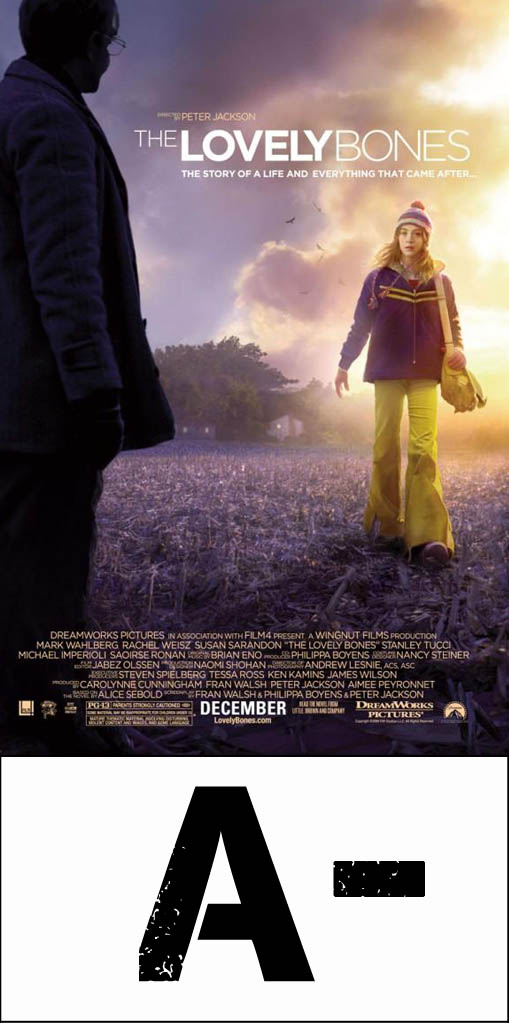 I read Alice Sebold’s novel The Lovely Bones in 2002 shortly after a close friend’s daughter died in a summer boating accident. We were both young parents back then – he with three young girls, and me with a four year-old daughter. My heart ached for him because, as a father, I could totally fathom the sheer and seemingly never-ending hurt flowing through his soul. Unexpected death is always a tragedy, but it seems the death of a child is particularly piercing and sad.
I read Alice Sebold’s novel The Lovely Bones in 2002 shortly after a close friend’s daughter died in a summer boating accident. We were both young parents back then – he with three young girls, and me with a four year-old daughter. My heart ached for him because, as a father, I could totally fathom the sheer and seemingly never-ending hurt flowing through his soul. Unexpected death is always a tragedy, but it seems the death of a child is particularly piercing and sad.
I mention this event because reading Sebold’s novel brought back the fear and horror of losing a child, but also cemented in my mind that which I already knew: The love between a father and his daughter is endless, brilliant and unlike any love on Earth. There is nothing I wouldn’t do to ensure the happiness and safety of my little girl. This, to me, is one of the messages of The Lovely Bones, both in book and film, and something film critics with negative things to say are missing, particularly Roger Ebert who gave the movie a burp above one star, calling it a “deplorable film” aimed at the Twilight crowd. He went on to write “the makers of this film seem to have given slight thought to the psychology of teenage girls, less to the possibility that there is no heaven, and none at all to the likelihood that if there is one, it will not resemble a happy gathering of new Facebook friends.” I think Ebert missed the boat, but I’ll get to that later.
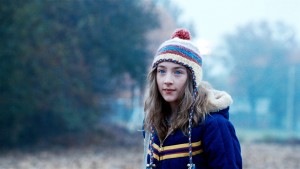 The Lovely Bones is directed by Peter Jackson (King Kong, The Lord of The Rings Trilogy) and, like the book, revolves around and is narrated by Susie Salmon (Saoirse Ronan), a 14 year-old girl going through the first hills and turns on the rollercoaster ride of being a teenager. Set in 1973, Susie is the oldest of three children and spends her time taking pictures (she wants to be a wildlife photographer) and having goo-goo eyes towards an older boy at her high school, Ray Singh (Reece Ritchie). The first third of The Lovely Bones introduces us to Susie’s family and their life in Pennsylvania. We meet her father, Jack (Mark Wahlberg), and her mother, Abigail (Rachel Weisz), her side-splitting grandmother, Lynn (Susan Sarandon), as well as her brooding younger sister Lindsey (Rose McIver) and her sweet little brother, Buckley (Christian Thomas Ashdale). The Salmons are, by all accounts, your typical American family living in the 1970s. But then something terrible happens to Susie.
The Lovely Bones is directed by Peter Jackson (King Kong, The Lord of The Rings Trilogy) and, like the book, revolves around and is narrated by Susie Salmon (Saoirse Ronan), a 14 year-old girl going through the first hills and turns on the rollercoaster ride of being a teenager. Set in 1973, Susie is the oldest of three children and spends her time taking pictures (she wants to be a wildlife photographer) and having goo-goo eyes towards an older boy at her high school, Ray Singh (Reece Ritchie). The first third of The Lovely Bones introduces us to Susie’s family and their life in Pennsylvania. We meet her father, Jack (Mark Wahlberg), and her mother, Abigail (Rachel Weisz), her side-splitting grandmother, Lynn (Susan Sarandon), as well as her brooding younger sister Lindsey (Rose McIver) and her sweet little brother, Buckley (Christian Thomas Ashdale). The Salmons are, by all accounts, your typical American family living in the 1970s. But then something terrible happens to Susie.
 Walking home from school, Susie is approached by George Harvey (Stanley Tucci), her hermit-like and eccentric next-door neighbor. He invites her to be the first one to try out the new clubhouse he’s made for the neighborhood kids, one that he’s constructed below ground in a cornfield. Despite her apprehension, Susie goes with Harvey and after some awkward and uncomfortable small-talk, Susie tries to leave and George Harvey rapes and murders her. We watch as Susie’s parents frantically search for her with the aid of Detective Len Fenerman (Michael Imperioli) and as Susie crosses over into, as Buckley describes it, the place between Earth and Heaven. This is the realm, like the book, where Susie watches her family deal with her death. It’s also the place she watches her killer and learns of his past transgressions and future plans. I won’t divulge much more about the plot, because those who have read the book know the rest of the story and those who haven’t may want to savor the cliffhangers and tension.
Walking home from school, Susie is approached by George Harvey (Stanley Tucci), her hermit-like and eccentric next-door neighbor. He invites her to be the first one to try out the new clubhouse he’s made for the neighborhood kids, one that he’s constructed below ground in a cornfield. Despite her apprehension, Susie goes with Harvey and after some awkward and uncomfortable small-talk, Susie tries to leave and George Harvey rapes and murders her. We watch as Susie’s parents frantically search for her with the aid of Detective Len Fenerman (Michael Imperioli) and as Susie crosses over into, as Buckley describes it, the place between Earth and Heaven. This is the realm, like the book, where Susie watches her family deal with her death. It’s also the place she watches her killer and learns of his past transgressions and future plans. I won’t divulge much more about the plot, because those who have read the book know the rest of the story and those who haven’t may want to savor the cliffhangers and tension.
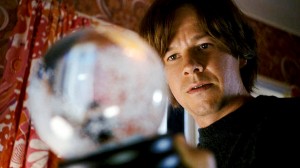 Peter Jackson and his Lord of The Rings screenwriting partners, Fran Walsh and Philippa Boyens, understand the heart and crux of Sebold’s novel and I believe they do a fantastic job delivering this vision to the screen. Roger Ebert, on the other hand, vilifies the movie, saying, in effect, the film treats the murderer, George Harvey, as a hero because he’s released Susie and other victims from life and sent them into an “Elysian Fields” where they laugh and play. He says we should all end up like her if this is heaven and the sooner the better. The failure of his opinion lies in him referencing Susie Salmon as “the owner of the lovely bones.” That he says this means he missed Susie’s last narrative in the movie (as well as the book), which is the following:
Peter Jackson and his Lord of The Rings screenwriting partners, Fran Walsh and Philippa Boyens, understand the heart and crux of Sebold’s novel and I believe they do a fantastic job delivering this vision to the screen. Roger Ebert, on the other hand, vilifies the movie, saying, in effect, the film treats the murderer, George Harvey, as a hero because he’s released Susie and other victims from life and sent them into an “Elysian Fields” where they laugh and play. He says we should all end up like her if this is heaven and the sooner the better. The failure of his opinion lies in him referencing Susie Salmon as “the owner of the lovely bones.” That he says this means he missed Susie’s last narrative in the movie (as well as the book), which is the following:
These were the lovely bones that had grown around my absence: the connections — sometimes tenuous, sometimes made at great cost, but often magnificent — that happened after I was gone. And I began to see things in a way that let me hold the world without me in it. The events my death brought were merely the bones of a body that would become whole at some unpredictable time in the future. The price of what I came to see as this miraculous lifeless body had been my life.
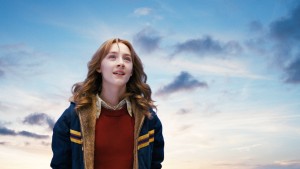 The Lovely Bones is not a tip of the hat and a nod of thanks to a serial killer for murdering a young girl and releasing her to a Salvador Dali-like spiritual netherworld where she, like Peter Pan, stays young forever. Not even close. It’s about bad things happening to good people. It’s about a family searching for identity and happiness when something they treasure is unexpectedly and tragically ripped from their bosom. It’s about a father and mother’s love, broken heart and depressed spirit. And, forgive me for waxing spiritual, but it’s also about the hope that all of us have that death is not the end. Sebold and the filmmakers assume 99 percent of the population of Earth believes this to some extent, and Susie’s struggle to accept this “heaven” is a central theme of the book and film. The film looks at this sadness, here and beyond, not as a stopping point, but as a seed, however tiny, for the expansion of love, hope and faith.
The Lovely Bones is not a tip of the hat and a nod of thanks to a serial killer for murdering a young girl and releasing her to a Salvador Dali-like spiritual netherworld where she, like Peter Pan, stays young forever. Not even close. It’s about bad things happening to good people. It’s about a family searching for identity and happiness when something they treasure is unexpectedly and tragically ripped from their bosom. It’s about a father and mother’s love, broken heart and depressed spirit. And, forgive me for waxing spiritual, but it’s also about the hope that all of us have that death is not the end. Sebold and the filmmakers assume 99 percent of the population of Earth believes this to some extent, and Susie’s struggle to accept this “heaven” is a central theme of the book and film. The film looks at this sadness, here and beyond, not as a stopping point, but as a seed, however tiny, for the expansion of love, hope and faith.
Yes, Mr. Ebert, while I agree with you many times, I categorically rebuke your seemingly thoughtless review and at the same time heap praise on Jackson’s film. It’s not an easy one to digest, but it is beautiful, heartfelt and hopeful. The soundtrack is haunting, the spiritual symbolism thought-provoking and the acting across the board, particularly Ronan and Tucci, is something to behold. The Lovely Bones is easily one of the year’s best movies.

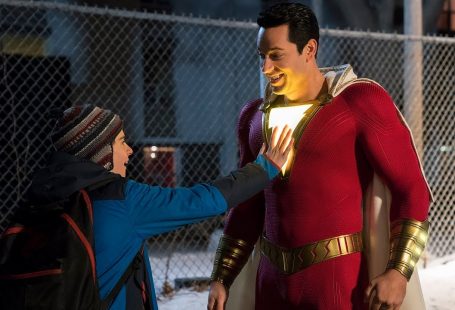


12 comments On Movie Review: The Lovely Bones
Andy, I think you are completely right!
wow, powerfully insightful! I have enjoyed your reviews and agreed with your take most of the time. Your wit with words is entertaining, hysterical at times and straight up. This, by far, is my favorite opine of yours. Honest, real, arguing for the just deserved merits of this movie, spoken from the heart and soul of a father. I generally avoid movies spun from books of this caliber, but you've persuaded me to give it a go- 1-to experience Sebold's creation visually (as heartbreaking as it may be) and 2-as a flick of my hand from my chin to the self-important, non-dimmentional persuading of Mr. Ebert
Read Eberts review in conjunction with yours and indeed, his fundamental rejection of faith and afterlife totally clouds his opinion. And while it's his to have, the fact that's it's based on misunderstanding and where the hell did you come to that conclusion “theology”, I'm not sure it's a correct one.
“We should all end up like her, and the sooner the better; preferably not after being raped and murdered.”
He says that as a bad thing- which is the what he's absolutely missing about the seed of faith that comes with a belief in the afterlife. I don't mean to wax all spiritual, But of course we should all end up like her– that's the hope. That's the germ and optimism of faith: that people can be reunited with those they love in a place that's full of love and can wait for those they in life to join them as well.
Ebert's misunderstanding of the film seems to come from his understanding that the life we're living now is as good as it gets and leaving it is the cold, dark end. A belief in the afterlife frees those who believe in it from this existential pessimism.
Either way, it's easy to tell this one came from the heart, Andy. Nice job.
Is it just me or does the girl remind anyone else of Joan Cusak?
Nice review, I probably still won't make it to the theater, even though I do have fifty bucks worth of gift cards.
Feel free to share those gift cards. Sitting on them is straight tragedy.
Pingback: Join Us on the KVNU For The People Movie Show Tonight! | ()
Thanks for all the positive comments on the review. It was sad to see Stanley Tucci get passed up at The Golden Globes, but anyone who has seen Inglourious Basterds knows that Christoph Waltz deserved that honor.
I can’t wait to see the movie. I love what you wrote about it and it made me even that much more excited to see it. I loved the book! As always I hope that the movie does it justice but from your review it sounds like I will enjoy it. I guess when they first announced that they were making it a movie I was scared because the book was so personal to me. The book covers a lot of important life lessons! Thank you for your review.
Thanks, Kathy!
A dreadful movie.
Care to elaborate, Doug?
I watched this movie and was at once transfixed and horrified. I didn’t read the book and if I had read the story line, I may have not seen the movie. I have three daughters and watching this caused me stress that I have never before felt in a movie.
I won’t say much more to avoid spoiling it other than it was tough for me to sit through the whole thing, but I am glad I did. I would recommend it to others with the caveat that they were warned it is a difficult film to sit through.
Outside of that, the above review and description well described the movie. Great cinematics, great acting, great plot and some of the suspense scenes nearly killed me. Of course much of this is obviously due to a well-written novel, but I can’t imagine what Jackson did could have evoked any more emotion, or provoked deeper thought on the eventualities that would follow such an event with an afterlife woven into the pattern.
It seems Ebert has more an issue with what I assume is atheism clouding his judgement and should have realized that before passing judgement. But this is when opinions turn into ears. Everyone has a couple and on this one, Eberts are no more valuable than anyone else’s.
Comments are closed.